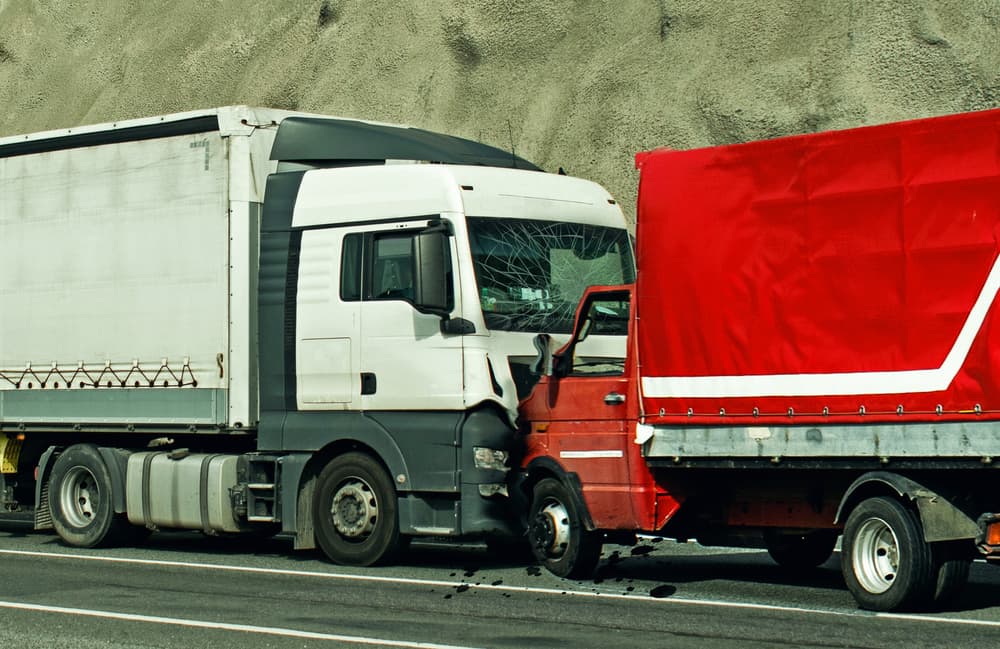According to the National Highway Traffic Safety Administration (NHTSA), rear-end collisions make up about one-third of all highway collisions in the U.S. When these types of crashes involve large trucks, the consequences can be far more severe due to the size and weight disparity between trucks and passenger vehicles. If you or a loved one has been in a rear-end truck accident, taking immediate action is essential to protecting your legal rights and pursuing the compensation needed for your recovery.
Consult a truck accident attorney near you as soon as possible. They can begin building a case and seeking compensation for your losses from liable parties.
Schedule A Free Case Evaluation Today!
Common Types of Trucks Involved in Accidents
Trucks play an essential role in delivering goods across the U.S. Unfortunately, their massive size and weight make them a significant hazard on the road. The types of trucks you may often see on the road can be classified into several types, largely determined by the type of cargo they are designed to move.
The following are some of the most common types of trucks involved in accidents:
- Big rigs, including semi-trucks, 18-wheelers, and tractor-trailers, are among the most common types of trucks you will encounter. Due to their powerful tractor units and attached semi-trailers, semi-trucks, also known as 18-wheelers or tractor-trailers, can haul large, heavy loads and are a staple in the freight industry.
- Flatbed trucks are another common type of truck seen on the road. They have an open design and offer much-needed flexibility for hauling various types of cargo that require easy loading and unloading.
- Tractor trucks, or bobtail trucks, have a distinctive design. The engine and driver's cabin are situated at the front. Frequently seen on freeways, their massive size and weight make them a considerable risk to passenger vehicle drivers.
- Tanker trucks are specialized vehicles designed to carry liquids or gases, including hazardous materials such as fuel or chemicals. Due to the nature of the cargo they carry, accidents involving tanker trucks can result in devastating fires or explosions.
- Delivery trucks, commonly used by companies like UPS, FedEx, Amazon, and USPS, are smaller in size and designed for shorter trips and local deliveries. These vehicles make frequent stops throughout their routes, creating congestion and contributing to slower traffic flow on both residential streets and highways.
- Utility trucks, like garbage trucks, street cleaners, and construction trucks, often operate in busy urban areas, where their work requires them to move slowly or stop abruptly. Garbage trucks, for instance, frequently stop to collect waste, often without much warning. This can create dangerous conditions for drivers who may not expect a large vehicle to be stationary in the middle of the road.
Large, heavy trucks on the roads are a necessary part of the supply chain. However, accidents involving these vehicles often result in severe injuries or property damage. In helping victims in the aftermath of such accidents, a knowledgeable truck accident lawyer can offer valuable assistance by thoroughly investigating the incident, gathering evidence, and determining liability.
How Do Rear-End Truck Accidents Happen?

Rear-end truck accidents occur when a truck collides with the vehicle in front of it, typically due to the truck not stopping in time. Several factors commonly contribute to these types of accidents, and in many cases, driver or trucker negligence is to blame. Understanding the root causes of rear-end truck accidents can provide valuable insights for determining liability and improving safety measures on the road.
Here are some of the most frequent causes of truck accidents:
Distracted Driving
Distracted driving habits, such as texting, talking on the phone, or multitasking, are major contributors to rear-end truck accidents. According to the Federal Motor Carrier Safety Administration (FMCSA), 28 percent of large truck accidents are caused by "recognition" issues.
These encompass distractions from within the vehicle, such as using handheld devices, or from external factors like road signs or hazards. While strict federal regulations limit the use of handheld devices while operating large trucks, other forms of distraction, like using dispatching devices or reading maps, remain problematic. Given the size and weight of commercial trucks, even a brief lapse in focus can result in a catastrophic outcome.
Poor Vehicle Maintenance
Like all vehicles, trucks require regular maintenance to operate safely on the road and minimize the risk of accidents. When maintenance is neglected, it can lead to mechanical failures that increase the risk of accidents. For instance, worn-out brakes or tires can prevent a truck from stopping fast enough to avoid hitting another vehicle.
Trucking companies are legally required to maintain their fleets by performing routine inspections and necessary repairs and keeping detailed records of these checkups. When these procedures are ignored or improperly handled, the company can be held liable for accidents caused by improper vehicle maintenance.
Fatigued Driving
Truck drivers are under pressure to meet tight delivery deadlines and are often expected to drive long hours without proper rest. This can lead to driver fatigue and significantly increase the risk of a rear-end accident. The Federal Motor Carrier Safety Administration (FMCSA) enforces Hours of Service (HOS) regulations to combat fatigue.
These rules limit truck drivers to 11 hours of driving within a 14-hour period, followed by 10 consecutive hours off duty. However, even with these regulations in place, some truckers may push beyond safe limits and put themselves and others sharing the road in danger. When drivers ignore guidelines and regulations about how long they are allowed to drive, they violate government rules and risk being held liable for accidents caused by their diminished capacity to drive safely.
Speeding
Traveling at excessive speeds reduces a driver's reaction time and increases the risk of losing control and causing a collision. When a large truck strikes another vehicle at high speed, the impact can cause catastrophic damage to other vehicles and their passengers, resulting in severe injuries or fatalities.
Many truck drivers resort to speeding to make up for lost time or meet tight delivery deadlines. While this might seem like a solution to stay on schedule, it dramatically increases the likelihood of accidents, including rear-end collisions. Speeding not only poses significant dangers but also violates federal regulations for commercial truck drivers. If a driver disregards these rules and causes an accident, they may be liable for any resulting damages.
Schedule A Free Case Evaluation Today!
Aggressive Driving
Aggressive driving behaviors like running stop signs, cutting other drivers off, or flashing high beams can also contribute to rear-end collisions. These reckless actions reduce the time and space needed to react to changing road conditions or other drivers, including situations where adverse weather causes slippery roads or reduced visibility.
Courts and insurance companies take aggressive driving seriously, often imposing strict penalties to discourage reckless behavior and promote safer roadways. In truck accidents, aggressive drivers usually face higher liability and may even face jail time in severe cases.
Overloaded or Improperly Loaded Cargo
Trucks carrying cargo that is improperly secured, imbalanced, or overweight poses significant safety risks. Federal and state laws impose strict weight restrictions on commercial trucks, typically capping the maximum weight at 80,000 pounds. While some trucks may obtain permits for heavier loads, these restrictions are designed to protect both road infrastructure and public safety.
Overloading increases stopping distances, reduces stability, and raises the likelihood of tire blowouts or brake failures. Additionally, trucks with excessive weight often struggle to maintain speed on inclines and may accelerate dangerously while going downhill.
Even if the cargo is not that heavy, improper loading can cause the truck to lose its balance and make it more prone to tipping over when it turns. Liability for accidents caused by overloaded or improperly loaded cargo may rest with the truck driver, the trucking company, or both.
If the driver fails to load the truck correctly or ignores weight limits, they can be held accountable for any resulting accidents. However, trucking companies that fail to provide proper training or follow strict FMCSA regulations may also bear some responsibility for their employees' mistakes.
Driving under the Influence
Driving under the influence of alcohol or drugs, including some prescription medications, significantly impairs judgment and reaction times. The legal blood alcohol concentration (BAC) limit for commercial drivers is set at 0.04 percent, half the limit for passenger vehicle drivers. However, even small amounts of alcohol or drugs can impair a truck driver's ability to react to road conditions.
Additionally, the sheer size and weight of commercial trucks make them inherently challenging to control, even under ideal conditions. When intoxication is added to the mix, the potential for catastrophic accidents increases dramatically. Truck drivers caught driving under the influence not only face criminal charges but may also be held liable in civil lawsuits for the damages caused by their impaired actions. In some cases, trucking companies may share liability if they fail to properly screen, train, or monitor their drivers.
With so many potential contributing factors, those injured in truck accidents may face difficulty in understanding how to pursue a claim and get the compensation they are entitled to. In such cases, an experienced truck accident lawyer can simplify the process by handling the legal aspects of the case, negotiating with insurance companies, and working to achieve the best possible outcome for their clients.
Who is Liable for a Truck Accident?

Determining liability in a truck accident case can be much more complex than in standard car accidents. While violations of federal or state regulations can play a role in assigning liability, they are not the only factor that should be considered in a truck accident case. Unlike standard car accidents, where the fault is often attributed to one driver, truck accidents can involve several responsible parties.
These parties can include:
- Truck Drivers: In many cases, truck drivers are directly responsible for accidents. Truck drivers who fail to adhere to traffic laws, drive while intoxicated, or disregard Hours of Service regulations may be held responsible for the crash and any resulting damages.
- Trucking Companies: Beyond the driver, trucking companies can also be partially or fully liable for accidents if they fail to properly train drivers, maintain their fleet of vehicles, or follow all safety protocols. For example, a trucking company that neglects routine vehicle maintenance can be accountable if a malfunctioning steering system causes the driver to lose control of the truck, leading to a collision.
- Truck Manufacturers: The manufacturer can be liable if an accident can be traced back to a defect in the truck or one of its parts. This includes situations where a malfunctioning part, such as a brake failure or tire blowout, leads to a crash.
- Other third parties: In truck accident cases, liability may extend to third parties like maintenance contractors and shipping and loading companies. Maintenance contractors may be responsible for any resulting accidents if they fail to perform adequate inspections or repairs on the vehicle. Similarly, shipping and loading companies can be liable if improperly loaded or secured cargo shifts during transit, causing the truck to become unbalanced and potentially triggering a crash.
With so many potential parties involved in a truck accident, determining liability can be challenging. A dedicated truck accident attorney can investigate all possible sources of liability and maximize your chances of obtaining full and fair compensation for your injuries and related losses.
Contact a Truck Accident Lawyer for A Free Consultation Today
After a truck accident, insurance companies will often go to great lengths to evade liability and offer you less than the true value of your claim. Having a knowledgeable lawyer by your side can prevent costly mistakes and allow you to focus on your recovery and well-being. When you choose to work with the right skilled personal injury lawyer, you can rely on them to take care of everything from the initial investigation to the final settlement.
Truck accident attorneys understand the financial burden of recovering from a truck accident, which is why they offer free consultations to discuss your case. Additionally, they work on a contingency fee basis, meaning you never have to worry about any upfront fees or costs unless/until they win your case. Schedule your complimentary case review today.

